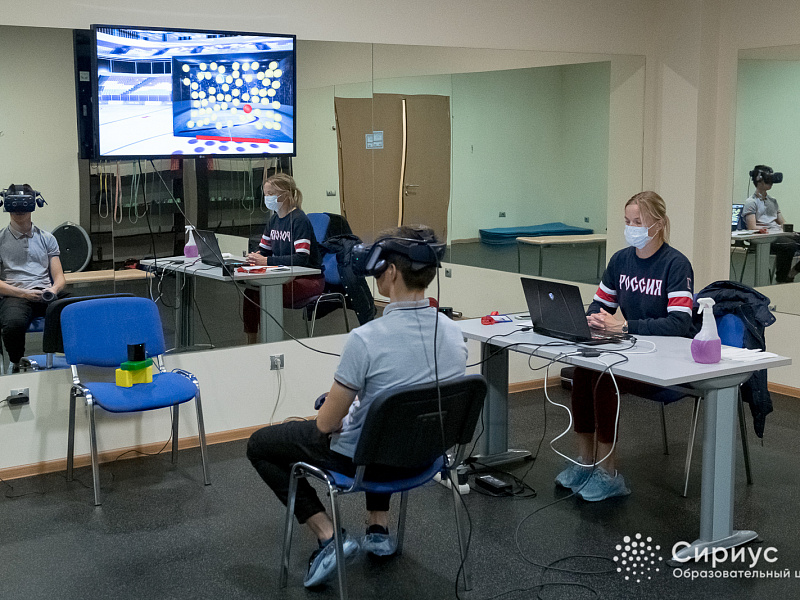ALL NEWS
More than 1800 players participated in unique tests at the Sirius Educational Centre

28.12.2020
Participants of the sporting programs of the Sirius Educational Centre regularly take various tests using special equipment. This allows you to evaluate the physical characteristics of young athletes, their technical skill and potential.
Since 2016, the Sirius Educational Centre has been running a unique system for identifying and training candidates for the U16, U17 and U18 Russian national ice hockey teams. The program was developed by the Centre in partnership with the Russian Ice Hockey Federation (RIHF). During the year, about 1800 promising athletes from all regions of Russia are selected, with 200 subsequently being selected for the youth national teams.
Traditionally, the selection of promising ice hockey players for participation in the specialised intensive Sirius programs is made on the basis of the sporting principle. Players from all regions of Russia are invited to each program, and they are trained by highly qualified experts and specialists recommended by the RIHF. In addition to this, the program uses innovative technologies to unleash the potential and capabilities of the junior athletes. Sporting intelligence is considered one of the important criteria for an ice hockey player.
The unique process of assessing sporting intelligence was named Sirin. It includes a set of equipment consisting of a virtual reality helmet (VR-helmet), a laptop, a control panel, a controller and specially developed software. Students of the Centre have to pass two VR tests.
In the first "Tracking" test, the subject sees eight balls, four red and four yellow, on the computer screen. They move continuously and gradually everything turns yellow. The player puts on a virtual reality helmet and closely monitors the balls. After stopping them completely, the athlete uses the remote control to select those that were originally red. The task is performed 15 times, and with each correct answer the task becomes more difficult: the balls move faster and faster.
In the second "Invisible" test, there are many yellow balls on the screen which randomly move around the screen and hit each other. The player's task is to find three invisible balls that move across the screen along with the yellow ones in 20 seconds, and show with the remote control where they are. This task is specifically for goalkeepers.
The first of these tests were held in April 2019.
In the future, tests for other sports will also be developed, and the tool will be recommended to sporting schools as a method to select the most promising children.
Since 2016, the Sirius Educational Centre has been running a unique system for identifying and training candidates for the U16, U17 and U18 Russian national ice hockey teams. The program was developed by the Centre in partnership with the Russian Ice Hockey Federation (RIHF). During the year, about 1800 promising athletes from all regions of Russia are selected, with 200 subsequently being selected for the youth national teams.
Traditionally, the selection of promising ice hockey players for participation in the specialised intensive Sirius programs is made on the basis of the sporting principle. Players from all regions of Russia are invited to each program, and they are trained by highly qualified experts and specialists recommended by the RIHF. In addition to this, the program uses innovative technologies to unleash the potential and capabilities of the junior athletes. Sporting intelligence is considered one of the important criteria for an ice hockey player.
The unique process of assessing sporting intelligence was named Sirin. It includes a set of equipment consisting of a virtual reality helmet (VR-helmet), a laptop, a control panel, a controller and specially developed software. Students of the Centre have to pass two VR tests.
In the first "Tracking" test, the subject sees eight balls, four red and four yellow, on the computer screen. They move continuously and gradually everything turns yellow. The player puts on a virtual reality helmet and closely monitors the balls. After stopping them completely, the athlete uses the remote control to select those that were originally red. The task is performed 15 times, and with each correct answer the task becomes more difficult: the balls move faster and faster.
In the second "Invisible" test, there are many yellow balls on the screen which randomly move around the screen and hit each other. The player's task is to find three invisible balls that move across the screen along with the yellow ones in 20 seconds, and show with the remote control where they are. This task is specifically for goalkeepers.
The first of these tests were held in April 2019.
In the future, tests for other sports will also be developed, and the tool will be recommended to sporting schools as a method to select the most promising children.
Similar news
Vladislav Tretiak held a working meeting with the Sochi Mayor
RIHF President Vladislav Tretiak held a working meeting with Sochi Mayor Andrei Proshunin.
08.09.2025
26.07.2025
17.07.2025
14.07.2025




